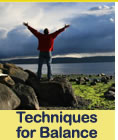    
Balancing Act: The Newsletter (No. 143: July 2011) Follow me on Twitter! You can find me here: New consulting and leadership tips posted daily! And find me on Facebook:  Techniques for balance
 I am wondering if we’re in an age of significant “dumbing-down,” or if that’s simply a condition we create to believe we have a superior approach. For example, a “permissions editor” at one of my major publishers, who was probably in her early 20s, actually pointed out to me that I’d need a written permission from the author to use his quotes, namely, Oscar Wilde. Two salesmen in Nordstrom’s, supposedly a very top customer-service operation (although Providence has a Nordstrom’s that is pretty poor), were engaged in some banter at the register. I approached holding a shoe to show them what I wanted. When neither looked at me, I waved the shoe in the air (attracting attention from other shoppers immediately). Finally, one actually said, “Are you in need of help with shoes?” (“No, I’m doing footwear aerobics.”) The casual obscenities on social media platforms are astounding, actually merely serving as adjectives and nouns for people who apparently don’t have better tools of expression. Most critique immediately becomes personal, not about the issue but about the person. (I find YouTube particularly thick with this tar.) Too many stand-up “comedians” merely use racial insults and profanity, without any hint of wit or insight. I find that most clerks can’t add and subtract mentally, but need a calculator, which they use so slowly that I’m often giving them the answer before they can compute it. The robotized “Have a nice day,” “Enjoy the show,” “No problem,” and “I’m Roger and I’ll be your server tonight,” have the same appeal and offer the same allurement as the airplane safety announcements or the service center’s promise that your call will be answered in the order in which it was received (and is “important” to them). Perhaps I’m unduly nostalgic. But consider this reported incident in Providence: A man walks into a coffee shop and after his purchase, the man says “Thank you” when handed the order. The clerk says, “No problem.” And then: “Don’t you young people say ‘you’re welcome’ any more?” “You want me to say, ‘You’re welcome?’’” “Yes.” “You’re welcome.” “Thank you!” “No problem.”  The human condition: Resolve I’ve been examining discipline and accomplishment lately, since I typically tell people whom I coach and mentor that I can’t control their talent or discipline. But perhaps we can all influence more than we think. It’s obvious on both the corporate and individual levels that we know what to do, why it’s important to do, and how to do it. If we could put a man on the moon within ten years from a standing start with now-primitive technology, we can certainly solve a customer problem in ten minutes or create a new service in a day. The same applies to weight loss (perhaps a ten billion dollar industry with customers becoming increasingly heavier), speaking in front of others, and learning to parallel park. Some very bright people, such as Malcolm Gladwell, would tell you that the secret is constant repetition and practice—the “10,000 times” rule. (Practice an athletic move or artistic expression 10,000 times and you’re bound to be better than most.) I don’t believe this, and certain things I’m superb at I’ve never practiced even 100 times. I’ve come to believe that the ability to consistently get things done, produce results, and control your environment is based on a combination of organization, self-discipline, self-esteem, and formalized accountability. I’ve called this mélange “resolve.” You can argue with my factors or nomenclature, but bear with me, please, on the concept. Some of us create, correct, and collaborate consistently ahead of deadline, performing above expectation, and garnering strong results (that’s the norm—it’s not that we never fail). I believe we resolve (as a verb) to get things done, and possess resolve (as a noun) to guide us. We create dates which we meet; sequences which have proper priorities; assemble resources that support the desired results. I can identify people with little resolve. They don’t write things down, don’t plan, tend to “play it by ear,” make poor assumptions, and have no monitoring systems for themselves or others. Most employees at the division of motor vehicles and others in large, impersonal bureaucracies don’t have resolve. But as individuals, we ought to resolve to have it. UPCOMING EVENTS
ALAN WEISS IN SYDNEY

THE ART OF THE REFERRAL: SPECIAL TELECONFERENCE

MILLION DOLLAR CONSULTING� COLLEGE

THE BREAKFAST BREAKFAST

BUILDING YOUR BUSINESS
|
Copyright 2011 Alan Weiss. All rights reserved.

Balancing Act® is our registered trademark. You are encouraged to share the contents with others with appropriate attribution. Please use the ® whenever the phrase "Balancing Act" is used in connection with this newsletter or our workshops. Join the Friday Wrap�
Weekly, 15-minute podcasts with segments on current business events, new intellectual property, and some humor. Monthly, ten-minute videos on business and self-development. And a full-day, free conference in mid-year (May 9). Three full work days—24 hours—of programming for a few dollars an hour in investment. Get this weekly booster shot right away. You’ll get all the archived material dating back to January. 2011 Teleconference Series
I've designed the next teleconference series around most frequently requested topics. Some topics, such as "Power Language," I'll take to the next level. New ones, such as "Story Telling," I'll deal with from the ground up. This is approximately ten hours of high-end development available live, on recording, and by download, all for a single investment. Shameless PromotionEast Greenwich, RI
|
| Having problems viewing this email, click
here. |
|
P.O. Box 1009 � East Greenwich, RI 02818-0964 � Telephone: (401) 884-2778 � Fax: (401) 884-5068
All Rights Reserved. Copyright 2026 Summit Consulting Group
ISSN 1934-3116






